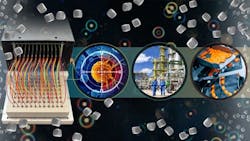NSF Launches $20M AI Center to Fast-Track Nanocrystal Discovery
The U.S. National Science Foundation launched a new research center that will create artificial intelligence-based technologies to quickly identify nanocrystals that show promise in polymers and pharmaceutical production.
NSF announced the opening of the $20 million NSF Center for Single-Entity Nanochemistry and Nanocrystal Design Aug. 25. Indiana University will lead the research center, which will study and characterize individual nanocrystals.
The researchers will use AI to rapidly screen nanocrystals in large numbers, revealing their distinct properties based on each individual crystal's composition and crystalline shape. The center will collaborate with other U.S. researchers and industry partners to expand discovery and design of nanocrystals for use in biomedicine, electronics, fuel production, chemical manufacturing and other areas.
“Nanocrystals are like a microscopic goldmine of molecular treasures," said David Berkowitz, NSF assistant director for mathematical and physical sciences. “The NSF Center for Single-Entity Nanochemistry and Nanocrystal Design will be a unique scientific resource in the U.S. by creating AI-based capabilities to rapidly explore and pinpoint individual nanocrystals with valuable properties.”
The center received funding through the NSF Centers for Chemical Innovation program, which supports research centers focused on major, long-term challenges in fundamental chemistry. The NSF Centers for Chemical Innovation program funds six major, multi-institutional research centers and several smaller incubator centers.
Two additional NSF Centers for Chemical Innovation will receive renewed funding of $18 million to $20 million each, including the NSF Center for Synthetic Organic Electrochemistry and the NSF Center for Genetically Encoded Materials.
About the Author
Jonathan Katz
Executive Editor
Jonathan Katz, executive editor, brings nearly two decades of experience as a B2B journalist to Chemical Processing magazine. He has expertise on a wide range of industrial topics. Jon previously served as the managing editor for IndustryWeek magazine and, most recently, as a freelance writer specializing in content marketing for the manufacturing sector.
His knowledge areas include industrial safety, environmental compliance/sustainability, lean manufacturing/continuous improvement, Industry 4.0/automation and many other topics of interest to the Chemical Processing audience.
When he’s not working, Jon enjoys fishing, hiking and music, including a small but growing vinyl collection.
Jon resides in the Cleveland, Ohio, area.

